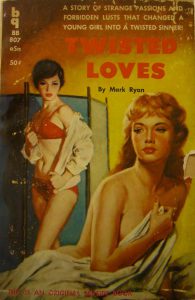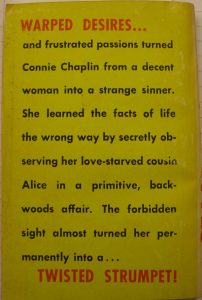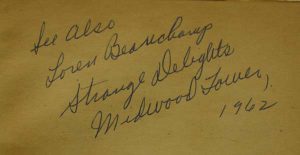 Twisted Loves, by Mark Ryan “an original Bedside Book”
Twisted Loves, by Mark Ryan “an original Bedside Book”
“A story of strange passions and forbidden lusts that changed a young girl into a twisted sinner!”
This is the template for the exploitation pulp. Lots of big breasted, horny women, sex, sex, and more sex, and then a heterosexual rescue on the final pages. From the cover to the content, this is what most people think of when they think of lesbian pulp.
The Plot: The book opens with Connie Chapin getting drunk in a Third Avenue bar, being mauled by a fellow customer, and then passing out in the street. She is rescued by Lee Fielding, “a tall masculine woman” who takes her home to her “modernistic apartment” on Riverside Drive, gives her a bath and more to drink, and then sleeps with her. Connie is ripe for seduction, as she has sworn off men after some bad casting couch experiences and an abortion, but due to the burning, constant desire all women in this book feel, she has to have some sort of sexual outlet, and Lee seems like an okay choice. At least she can’t get Connie pregnant!
Connie conceals her new relationship from her roommate Paula, who deals with her own uncontrollable desire by anonymous sex in Central Park when none of her beaux are available. A nympho and a lesbian rooming together, Connie thinks at one point. Paula periodically tries to fix Connie up with Tom, a guy at her office, but even though Connie thinks “he might be the man would would rescue her from the long slide into loneliness, alcoholism and lesbianism” (foreshadowing!) she keeps turning him down when he calls.
Trouble strikes when Lee has to go away on business and Connie is left alone with her “throbbing, unsatisfied loins”. In desperation she jumps roomie Paula one hot night. “I tell you, I couldn’t help myself,” Connie sobs. “It was a sudden craving!” Paula isn’t buying it. “Ugh! I feel filthy even now. You make me sick.” Paula moves out the next day, and Connie thinks of suicide. However, a telegram from Lee announcing her return arrives, and presto, suicidal impulses vanish. Connie then makes herself some hard boiled eggs, salad and coffee. Remember that menu the next time you feel down in the dumps.
Connie is over at Lee’s airing out the apartment, when the doorbell rings. It’s Jane Withers, not the child actress, but “an exceptionally handsome young woman,” an ex of Lee’s who wants her back. Jane and Connie insult each other (“upstart little slut!”), then fight (“they clawed at each other violently”), tearing their clothes (“bare to the waist and covered in blood”), and then “a strange thing began to happen”…yes, sex, just what Connie’s been jonesing for. They apply iodine to each other’s scratches, chatting cozily, then have more sex, then fall asleep in Lee’s bed. Connie wonders “if it would be possible for the three of them to form a little unit, she and Jane and Lee. It was unusual, but it sounded appealing.”
Lee goes for it–“why not?” and everything is idyllic for about a page and a half (“There was something tremendously wicked and shameless about such a set-up that delighted all three of them”). Jane moves in with Connie and they set up a rotating schedule for who sleeps with who and when, after one unsatisfying attempt at a threeway.
Alas, with no positive models for this kind of polyamorous lifestyle, things fall apart. I blame Connie, who starts to second-guess the whole arrangement, turning paranoid about whether Jane is edging her out of Lee’s affections. One night, when Jane is with Lee, she falls back on old habits and drowns her sorrows in alcohol. When she staggers home there’s a guy in the hallway, waiting for her. No, it’s not a stalker, It’s Tom, the persistent friend of Paula’s who’s been phoning her for a date, despite her many refusals, despite the fact that he’s never even seen her! Hmmm, maybe he is a stalker. He helps her into her apartment and makes her some coffee.
Suddenly, Connie decides he’s what the doctor ordered, and they have sex. When the “intensity of their passion” has “burned away her sick love of women,” Connie declares her love. Tom points out, “We’re strangers, we don’t even know the first thing about each other.” Connie hints, “You don’t know what you saved me from, Tom.” He soon finds out, for who should walk in but Jane. Rather miffed by Connie’s two-timing (three-timing?), she gives Tom the skinny on Connie’s lesbian proclivities, and then stalks back to Lee. Connie tries to jump out the window, believing that now that Tom knows about her lesbian doings, he won’t want her anymore. Who does she think is reading this book? Tom pulls her back inside. He still loves her. “You were a crazy mixed up kid…you aren’t any real lesbian.” The end.
Sex: Sex is always a rush: “They brought each other to the summit of ecstasy,” but problems arise when you can’t get your fix: “She had grown so dependent on Lee that she needed her four to five times a week.”
Drinking: Connie drinks whiskey until she passes out. Lee gives her creme de menthe as a hangover cure. Jane makes a pitcher of cocktails and when Connie arrives home from work, pours “two cold shimmering drinks.”
 Homo Psychology: In a flashback, Connie recalls a visit to some farming relatives one summer. On the farm she develops a crush on her buxom cousin Alice after some nude swimming in the creek. Then she spies Alice getting it on with a farm hand behind a haystack (oh those primitive rural folk!) and feels disgusted. “Maybe in her adolescent crush for Alice and in the bitterness of Alice’s ‘betrayal’ the seeds of Connie’s strangeness had been sown.”
Homo Psychology: In a flashback, Connie recalls a visit to some farming relatives one summer. On the farm she develops a crush on her buxom cousin Alice after some nude swimming in the creek. Then she spies Alice getting it on with a farm hand behind a haystack (oh those primitive rural folk!) and feels disgusted. “Maybe in her adolescent crush for Alice and in the bitterness of Alice’s ‘betrayal’ the seeds of Connie’s strangeness had been sown.”
Barbara’s Take: Barbara celebrated 1959 as a banner year for lesbian literature in The Ladder’s end of the year book round-up. The numbers were up; 52 novels, more than double the stats for 1957. “Without exception the 18 hardback novels were either sympathetic to Lesbianism or pointed no moral of any kind,” Barbara exults. The 34 paperback originals on the other hand, “ranged from nearly pornographic tripe to lyric and beautiful writing.” Barbara doesn’t mention Twisted Loves beyond including it on the list (just above Artemis Smith’s Odd Girl) but I think we all know where it falls on the tripe to lyric scale.
There was a handwritten note (Barbara’s?) inside the cover of the copy I got from the collection that said “see also Loren Beauchamp Strange Delights, Midwood Tower, 1962.” I’ll be on the lookout.
 Comment: Everything about this book screams “cheap exploitation!” from the taxicab yellow cover to the way the editors get their own title wrong in the back-of-the-book catalog (“If you’ve enjoyed Twisted Lusts, you may also want to order…”). And yet, there’s something rather appealing about this unpretentious, “I am what I am” approach. Maybe because it followed my readings of The Lion House and The Golden Cage, I was ready for a story of adult women identifying as lesbians and having sex with each other, instead of all the literary pussyfooting I’d had to wade through in the previous books with so little reward for my trouble. At least this book delivers what it promises.
Comment: Everything about this book screams “cheap exploitation!” from the taxicab yellow cover to the way the editors get their own title wrong in the back-of-the-book catalog (“If you’ve enjoyed Twisted Lusts, you may also want to order…”). And yet, there’s something rather appealing about this unpretentious, “I am what I am” approach. Maybe because it followed my readings of The Lion House and The Golden Cage, I was ready for a story of adult women identifying as lesbians and having sex with each other, instead of all the literary pussyfooting I’d had to wade through in the previous books with so little reward for my trouble. At least this book delivers what it promises.
And aside from the “women are constantly in heat” premise that drives the book, I was surprised at how possible a positive reading was, with a little selectivity: “The world condemned their sort of love, Connie thought, but what does the world know of Connie Chapin’s private torments and fears?” and “It was probably better to sleep with other women than to get drunk in cheap bars and collapse on the streets. In those terms, at least, lesbianism made a certain sense.” Lee brags that giving up men has kept her young, as if Lesbianism was some kind of health fad. This treatment of Lesbianism as a pragmatic lifestyle choice is at odds with the melodramatic heterosexual rescue at the end, which is so improbable you wonder whether the author was just faking that “intense passion”.
I imagine this is the kind of book that lesbian readers might have revised by tearing out the last twenty pages. If you end on page 153 with Connie, Lee and Jane happily entwined in a menage a trois, the book easily moves into the “sympathetic” category. Unfortunately, no amount of excised scenes will earn Twisted Loves the “lyric and beautiful writing” award.
